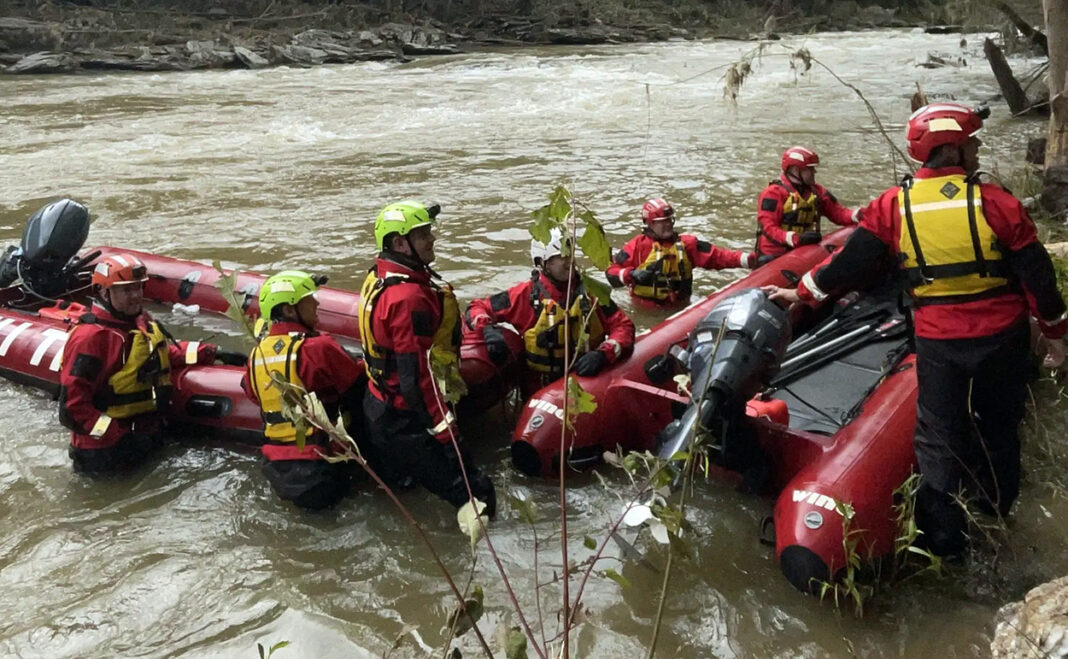By Katie Rousonelos, WEM
CAMP DOUGLAS, WI – Wisconsin’s Urban Search and Rescue Task Force, known as Wisconsin Task Force 1 (WI-TF1), recently returned from their first major out-of-state deployment. Sixteen members were sent to North Carolina for assistance following Hurricane Helene.
“The journey to North Carolina was a little rough as we were travelling during the tail end of the hurricane,” said Doug Vrechek, the rescue team manager for the deployment. “We couldn’t get to our destination right away because of road conditions and detours. Our travel time there was 23.5 hours in what should have been a 16- hour trip.”
North Carolina Emergency Management requested a swift water rescue team to assist with search efforts through the Emergency Management Assistance Compact. WI-TF1 members left their homes from across the state on September 27, 2024, and arrived at The Regional Emergency All-Climate Training (REACT) Center at Volk Field, Camp Douglas, Wisconsin for deployment. Within five-and-a-half hours, the team packed up necessary gear for their mission and deployed to North Carolina.
“With all the rescue disciplines the task force is trained in, when we got down there, we were able to be treated as a multi-tool and were utilized in different ways,” said Bob Zimmerman, one of the WI-TF1 leaders. “We went in as a swift water team, but based on our training, we helped to assist with search and recovery efforts in other disciplines.”
Zimmerman said some of their days would start at 6:30 a.m. and could end as late as 8:30 p.m. They helped search portions of the Pigeon River as well as driving a utility terrain vehicle, truck, or walking into mountain areas of Haywood County, North Carolina for land-based searches.
“There were 16 of us that were down there and got back to Wisconsin,” said Vrechek. “What you didn’t see was the support from our fire departments and families as well as everyone who helped out behind the scenes from The Department of Military Affairs’ Wisconsin Emergency Management (WEM).”
One of those providing help behind the scenes was Matt Davies, the WI-TF1 program manager and WEM’s director for the REACT Center.
“I make sure they are funded, trained, and equipped so that they are ready to go out the door when they are deployed,” said Davies. “The task force goes through hundreds of hours of training to get to that deployable status.”
To be able to be sent out for swift water rescue, task force members went through specialized training courses. Some of the courses included learning how to read rivers and assess hazards, defensive and offensive survival swimming techniques, and how to operate boats in fast-moving water.
“Going out on missions, like the one in North Carolina, are why these task force members trained for years,” said Davies. “To be able to go out and help those in North Carolina, we feel a sense of accomplishment in supporting them and making a difference in hurricane-affected areas.”
“We are incredibly proud of the Wisconsin Task Force for their dedication and commitment to helping others, whether it is in Wisconsin or in the nation,” said Greg Engle, administrator of WEM. “Their commitment reflects the spirit of our agency and the local fire departments they serve.”
The task force members who were deployed said they gained connections with other state and federal task force teams. With their first major out-of-state deployment under their belts, they plan on using their experiences to teach other task force members and their local fire departments what they learned.
“We are a better team with what we’ve done in North Carolina,” said Vrechek. “We brought back a tremendous amount of knowledge and experience to apply to anything back in Wisconsin or what could happen in other states as well.”
Members of WI-TF1 deployed to North Carolina were from the following fire departments: Appleton, Fond du Lac, Green Bay, Janesville, La Crosse, Neenah/Menasha, Oshkosh, and Superior.
WI-TF1 is a response asset owned and managed by Wisconsin Emergency Management, a division of the Wisconsin Department of Military Affairs. The task force currently has more than 130 highly trained personnel including structural engineers, canine handlers, and technical search specialists.






